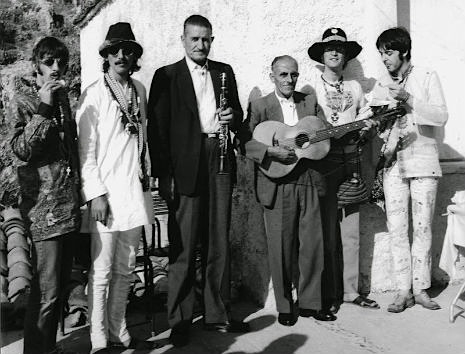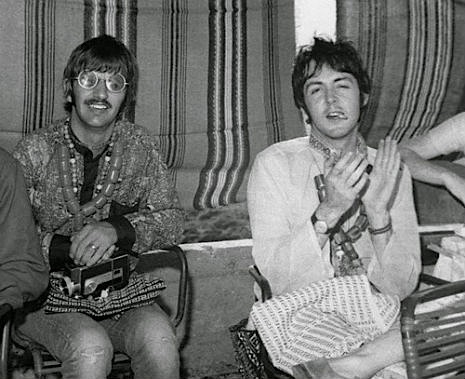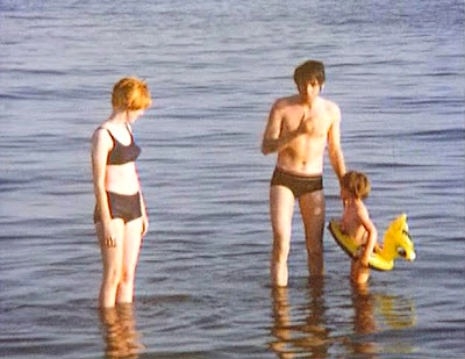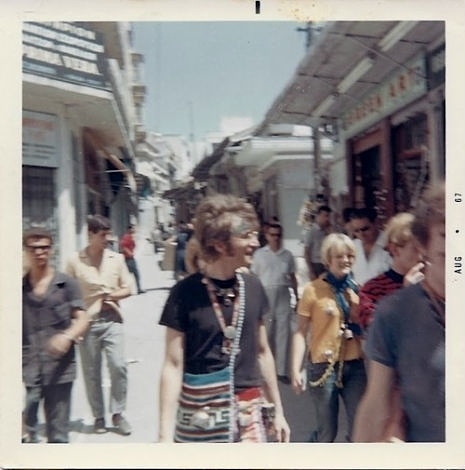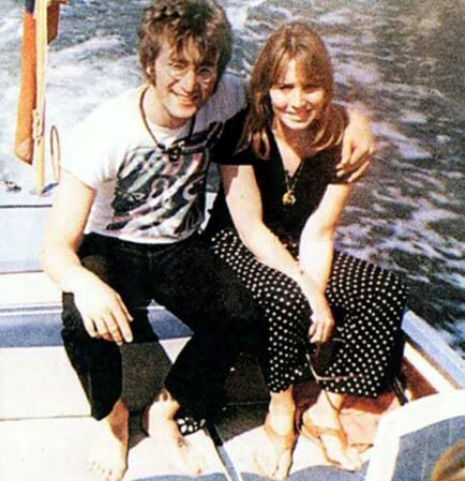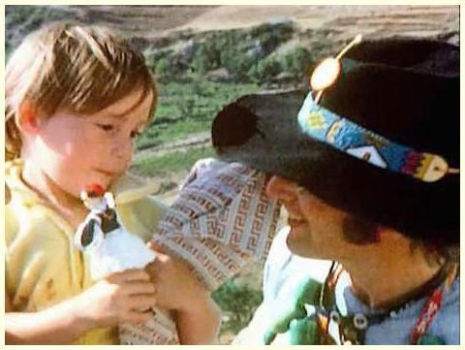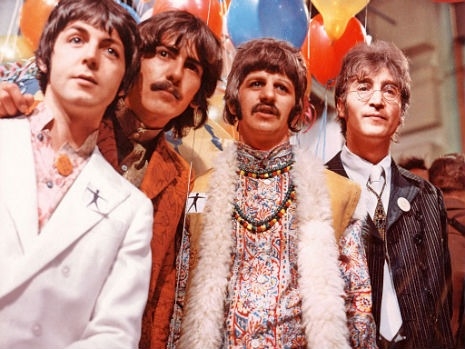
The Summer of Love 1967: John Lennon was tired of Britian, tired of living a life in public, tired of the relentless clamor of fans, and the dreary British weather.
The Beatles had stopped touring in 1966 and were now focusing their energies on being a studio band. Lennon wanted some peace and quiet—somewhere he could have a life of privacy.
At a meeting The Beatles held to discuss plans for their next film The Magical Mystery Tour in July 1967, Lennon raised the suggestion of the band buying a Greek island for them all to live on. As Lennon said at the time:
We’re all going to live there, perhaps forever, just coming home for visits. Or it might just be six months a year. It’ll be fantastic, all on our own on this island. There some little houses which we’ll do up and knock together and live communally.
They would build four villas on the island to provide accommodation for The Beatles and their families. An entertainment complex and a recording studio would be built in the middle, and there would also be homes for staff and friends.
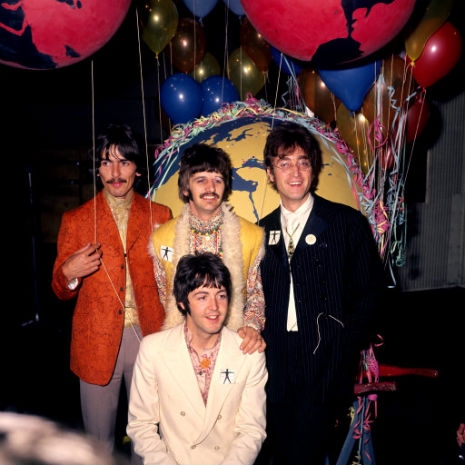
Amusingly, the idea may have been inspired by Gerry Anderson’s kids puppet series Thunderbirds, where the fictional Tracy family lived on a specially altered island from which they operated. The Beatles had lived together before when learning their trade in Hamburg, and of course, memorably on screen in Help!, where they shared a home in four connected houses.
According to Beatles publicist Derek Talyor in his autobiography 20 Years Adrift:
The four Beatles would have their network at the centre of the compound: a dome of glass and iron tracery not unlike the old Crystal Palace over the mutual creative/play area, from which arbours and avenues would lead off like spokes from a wheel to four vast and incredibly beautiful separate living units. In the outer grounds, the houses of the inner clique: Neil (Aspinall), Mal (Evans), Terry (Doran) and Derek, complete with partners, families and friends…
Lennon may also have been talked into it by Yanni Alexis Mardas, better known as Magic Alex, the Greek electronics whizzkid who impressed Lennon with his Kinetic Light Sculptures at the Indica Gallery. As Paul McCartney later said in a biography by Barry Miles’ Many Years From Now:
Alex invited John on a boat holiday in Greece, and we were all then invited. There was some story of buying a Greek island or something. It was all so sort of abstract but the first thing we had to do is go to Greece and see if we even liked it out there. The idea was get an island where you can just do what you want, a sort of hippie commune where nobody’d interfere with your lifestyle.
I suppose the main motivation for that would probably be that no one could stop you smoking. Drugs was probably the main reason for getting some island, and then all the other community things that were around then… it was drug-induced ambition, we’d just be sitting around: “Wouldn’t it be great? The lapping water, sunshine, we’d be playing. We’d get a studio there. Well, its possible these days with mobiles and…” We had lots of ideas like that. The whole Apple enterprise was the result of those ideas.
The plan was serious enough for Alex to strike a deal with Greek government giving The Beatles diplomatic immunity—this allowed the band to carry drugs into the country. As part of the deal to obtain diplomatic immunity, the Fab Four had to pose for pictures for the Ministry of Tourism, this was arranged without the band’s knowledge.
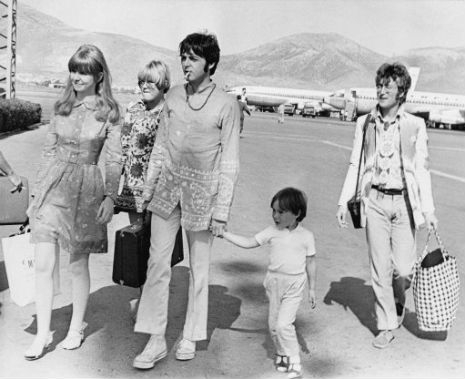
July 1967, Ringo Starr, George Harrison, his wife Pattie, and Neil Aspinall left on the 22nd. John Lennon, his wife Cynthia, their son Julian, Paul McCartney and his girlfriend Jane Asher, Pattie’s 16-year-old sister Paula, Magic Alex, Mal Evans and Beatles’ assistant Alistair Taylor traveled out on the 23rd.
MV Avi a 24-berth luxury yacht, with full crew, was hired. The Beatles and their entourage spent several days island-hopping, sunbathing and consuming large quantities of LSD, as Paul later reported:
We went on the boat and sat around and took acid. It was good fun being with everyone, with trippier moments. For me the pace was a bit wearing. I probably could have done with some straight windows occasionally, I’d have enjoyed it a bit more.
Harrison, meanwhile, enjoyed the holiday:
It was a great trip. John and I were on acid all the time, sitting on the front of this ship playing ukuleles. Greece was on the left, a big island on the right. The sun was shining and we sang “Hare Krishna” for hours and hours.
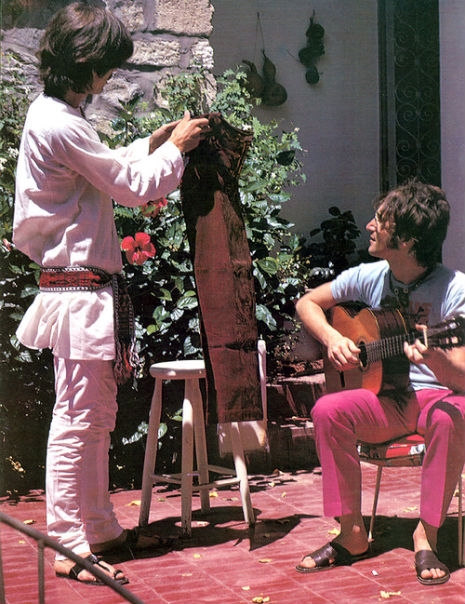
From 1967 until 1973, Greece was under the rule of a right-wing military junta, following a military coup led by Brigadier General Stylianos Pattakos and Colonels George Papadopoulos and Nikolaos Makarezos in April 1967. In other words, The Beatles were having their jollies and planning to set up home in a fascist state. When questioned about this, Lennon, ever the self-centered conciliatory diplomat when facing criticism said:
I’m not worried about the political situation in Greece, as long as it doesn’t affect us. I don’t care if the government is all fascist, or communist. I don’t care. They’re all as bad as here; worse, most of them. I’ve seen England and the USA, and I don’t care for either of their governments. They’re all the same. Look what they do here. They stopped Radio Caroline and tried to put the Stones away while they’re spending billions on nuclear armaments and the place is full of US bases that no one knows about.
The prickly problem of politics dismissed, the search for a perfect island continued. According to The Beatles Bible:
[Alex] Mardas flew to Greece and found an island, often cited as Leslo, although such an island appears not to exist. The island is said to have had around 80 acres surrounded by four habitable islands, a small fishing village, beaches, 16 acres of olive groves, and was priced at £90,000 [equivalent of $216,000 in 1967].
This is where the story becomes cloudy—perhaps the problem of too many drugs? Firstly the name of the island has never been correctly established—Lelso? Leso? While, George later recounted a visit to one island:
Eventually we landed on a little beach with a village, but as soon as we stepped off the boat it started pouring with rain. There were storms and lightning, and the only building on the island was a little fisherman’s cottage - so we all piled in: ‘‘Scuse us, squire. You don’t mind if we come and shelter in your cottage, do you?’
The island was covered in big pebbles, but Alex said, ‘It doesn’t matter. We’ll have the military come and lift them all off and carry them away.’ But we got back on the boat and sailed away, and never thought about the island again.
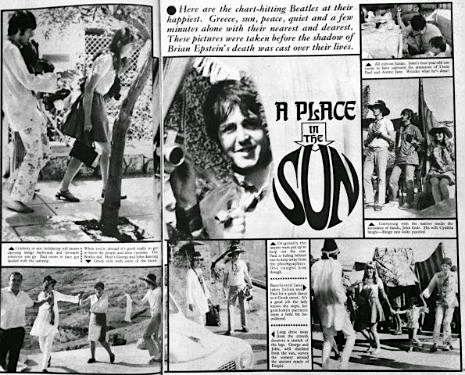
Of course, this may be a different island from the one The Beatles instructed NEMS employee Alistair Taylor to buy on their behalf. Taylor was sent back to London to organize the purchase. Special export dollars had to be purchased before the Greek government would authorize purchase of the island—which has been described as “guitar shaped” with islands around it.
By the time Taylor had negotiated the purchase, The Beatles had moved onto their next pet project, as McCartney recalled:
It came to nothing. We didn’t buy an island, we came home. We were great at going on holiday with big ideas, but we never carried them out. We were also going to buy a village in England - one with rows of houses on four sides and a village green in the middle. We were going to have a side each.
That was what happened when we got out. It was safer making records, because once they let us out we’d just go barmy.
However, the failure to buy an(y) island made The Beatles a profit, as the exchange rate had risen, as Harrison explained:
It was about the only time The Beatles ever made any money on a business venture. To make the purchase, we’d changed the money into international dollars or some currency. Then, when they changed the money back, the exchange rate had gone up and so we made about twenty shillings or so.
Well, slightly more than shillings George. When the original £90,000 ($216,000) were sold back to the Greek government, the more favorable exchange rate meant the band picked up $27,360 in profit.
The Beatles returned from their Greek holiday at the end of July.
